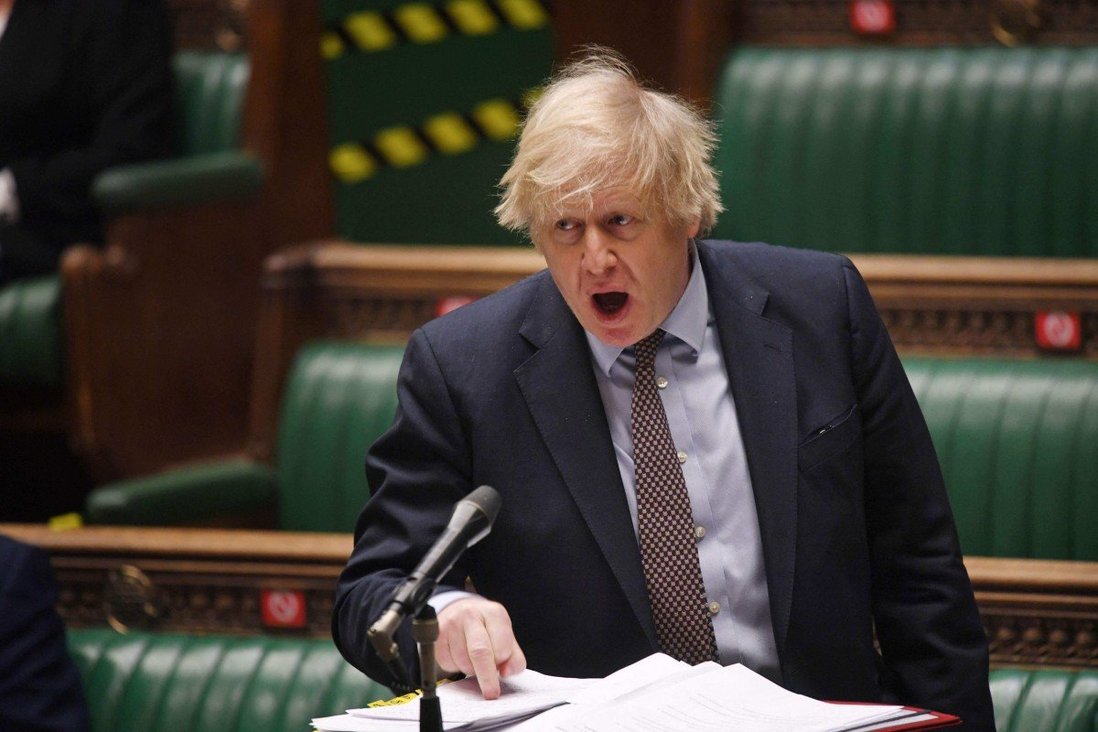www.aljazeerah.info
Opinion Editorials, March 2021
Archives
Mission & Name
Conflict Terminology
Editorials
Gaza Holocaust
Gulf War
Isdood
Islam
News
News Photos
Opinion Editorials
US Foreign Policy (Dr. El-Najjar's Articles)
www.aljazeerah.info
|
Global Britain's Post-Brexit Gamble Backfiring as China, EU Leave the UK Behind By Terry Su SCMP, March 10, 2020 |
 |
 |
|
| British Prime Minister Boris Johnson, March 3, 2021 |
Global Britain’s post-Brexit gamble backfiring as China, EU leave the UK behind
The post-Brexit calculation in London was that even if Britain struggled on its own, it would still be better than life in a teetering EU Things do not seem to be going that way, though, as the EU shows signs of going places and global trade deals are sealed in the UK’s absence
British Prime Minister Boris Johnson attends Prime Minister’s Questions at the House of Commons in London on March 3. Photo: AFP With US-China relations attracting much of the world’s attention after US President Joe Biden was sworn in, Britain is still earning its share of limelight for its playing hardball against China. Some British politicians have moved to concur with the US government’s condemnation of genocide in Xinjiang , the UK government revoked the broadcasting licence of Chinese state-owned news channel CGTN and British media play up stories of human rights abuses in China and Chinese spy activities in Britain. British Prime Minister Boris Johnson has called for the annual Group of 7 summit to be converted into a “D10” of leading democracies in a value rivalry against China. Given all this provocative posturing, few observers would take seriously Johnson’s personal pleading at a recent meeting with some businessmen that he was “fervently Sinophile”.
Britain, immersed in its tradition of practicality and balance of power in foreign policy, might have played a restrained and moderate game with China. It could have gone along the line taken by the European Union, especially at a time when it split with the EU and China’s influence as an economic and trade power continues to grow.
One might say London is launching its “Global Britain” initiative by marching in lockstep with a China-bashing America, but that doesn’t add up. Britain’s free trade deal with Turkey is no more than pint-sized; its bilateral economic agreement with Japan does not play to its advantage, given a lack of competitiveness in Britain’s industrial structure; and the United States no longer has deep enough pockets or the willingness to pay Britain for its ideological loyalty. A reinvented British Commonwealth aligning Australia, New Zealand and perhaps India? Good luck.
“Europe” is the buzzword, according to Cambridge history professor Brendon Simms. He wrote in his book Britain’s Europe that the “virtuous cycle” of Britain’s fortune for the past 1,000 years has been “one which began and ended in Europe”.
China bans BBC World News over Xinjiang report and after China state broadcaster loses UK licence
China bans BBC World News over Xinjiang report and after China state broadcaster loses UK licence
When former British Prime Minister David Cameron went ahead with the Brexit referendum, he was far from alone in figuring that, even if his gamble went awry, whatever Britain’s problems were then would pale into insignificance with those of the EU. Pessimistic tea-leaf reading of the EU had flooded the British media after the 2008 global financial crisis.
John Gray, a prominent scholar of political philosophy, accused the EU of being “hubristic” and judged it to be “floundering” in 2012. He went so far as observing in early 2014 that “half of Europe is being sacrificed in order to solve the 20th century German question”. In 2017, Bill Emmott, a former editor-in-chief of The Economist, gave a diagnosis of “European Paralysis” and an assertion that “the EU, on the basis of its current trajectory and policies, is heading towards disintegration and eventual demise”.
Back then, Britain was weathering the financial storm well. London was worried about the economic viability of some EU member states and was particularly outraged by the EU’s bailout of Greece. Together with simmering domestic discontent with the perception of immigrants pouring into the country, it ultimately pushed the Britons over to the Brexit decision.
The post-Brexit calculation in London was that even if Britain struggled on its own , it would still be better than life in a teetering EU. If and when Britain so chose, it could always come back into the EU on better terms because in doing so, to quote Simms, “the peoples of the United Kingdom will not only have saved themselves in Europe by their efforts but will have rescued the euro zone by their example”. Unfortunately for Britain, things do not seem to be going that way. The euro zone is not falling off a cliff, despite dark forecasts by such conservative Europhobes as Douglas Murray. Largely “through sharp ruptures in a period of crisis” – namely the Covid-19 pandemic – as Simms unwittingly predicted, the EU actually shows strong signs of going places. The pandemic has demonstrated the trustworthiness and dependability of Germany and France’s leadership to EU member states. Now, all major parties in Italy, the populist Five Star Movement included, have rallied under pro-EU Prime Minister Mario Draghi in an orchestrated cooperation with the EU in return for a financial aid package – a telling showcase of Europeans’ willingness to go hand in hand with one another in this trying time. Even graver implications for Britain came from the recent Regional Comprehensive Economic Partnership , followed soon after by the EU-China investment agreement . Last but not least, the City of London’s status as a global financial hub is in danger. The EU could be inclined to undermine the City for its own benefit and is making it known it will not allow euro-denominated trading to remain in the City.
This change of fortunes is drastic and Britain is losing its cool. While engaging in diversion with China as a punching bag, Britain’s gambit is aimed at the EU. Simms ominously put it in 2015 that Britain would “have to coordinate her economic and environmental policies with the single euro zone state in order to avoid a competitive ‘race to the bottom’ in trade with dictatorship, particularly the People’s Republic of China”.
The bandwagon has been set rolling, and it could be three, five or 10 years before Britain rejoins the EU as a full member. Giving up the pound could be a key part of the deal to be not only “with Europe” but also “of it”, thus ignoring Winston Churchill’s famous warning.
***
Terry Su is president of Lulu Derivation Data Ltd, a Hong Kong-based online publishing house and think tank specialising in geopolitics. Prior to the establishment of Lulu Derivation with his partners in 2019, Mr Su spent more than two decades as an investment banker and senior business executive. From 2003 to 2006, Mr Su was an external member of the Departmental Advisory Committee of the Department of Chinese, Translation and Linguistics at City University of Hong Kong. He has bachelor's degrees in history (1985) and in international politics (1987) from Peking University, and a master of letters degree in international relations (1991) from Oxford University (with Swire Scholarship).
***
Share the link of this article with your facebook friends
|
|
|
|
||
|
||||||


